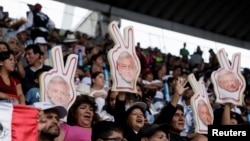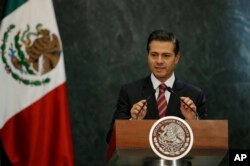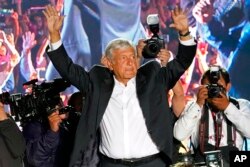Mexico's presidential election Sunday is shaping up to be a historic poll. With their nation plagued by corruption and violence, voters appear to be heading to the ballot box with sweeping change in mind.
Polls consistently show the left-leaning Andres Manuel Lopez Obrador, widely known as AMLO, with a double-digit lead. Voters also will pick candidates to fill 128 seats in the country's Senate and 500 seats in the Chamber of Deputies, the country's higher and lower legislative bodies, respectively.
Outgoing President Enrique Pena Nieto, elected in 2012, sports a historically low approval rating, slipping as low as 17 percent last year, according to Pew Research Center polling. The Mexican constitution restricts candidates to one six-year term, with no chance of re-election. And Pena Nieto's six years were marked by social and economic turmoil.
In 2012, Pena Nieto came to power in a country dealing with violence, much of it linked to the country's notorious drug cartels, and a sluggish economy. Pena Nieto's critics have said he has done little to address those ills, with some insisting he has made them worse.
In 2017, there were more than 25,000 homicides in Mexico, the highest number since the country began recording data on homicides in 1997. According to CNN, officials attribute the increase to a surge in drug-related crimes since 2014, when 15,520 people were slain.
That was the year notorious drug kingpin Joaquin "El Chapo" Guzman was captured in Mexico. In July 2015, he escaped from a Mexican prison for a second time, after Pena Nieto rejected an offer by the U.S. to prosecute Guzman after his first escape. Guzman has since been recaptured and extradited to the U.S.
"Pena said it wasn't necessary to send him because our system works," political analyst Jose Antonio Crespo told the Los Angeles Times. "When he escaped, the whole world saw what we already know: that the level of corruption is extremely high."
Such allegations of corruption have long plagued Pena Nieto's Institutional Revolutionary Party, or PRI. The party held virtually uncontested control of the country from 1929 to 2000. PRI recaptured the presidency in 2012 and is apparently fighting to hold on to it.
"The machinery seems to have completely broken down as local operators are deserting the party," Mexico scholar Michael Lettieri told Forbes. "The party's best efforts to mobilize deeply priista groups of government employees and peasants have not provided a meaningful push for the PRI's presidential, legislative or gubernatorial candidates."
Economically, 2017 saw historic devaluations of the Mexican peso, as well as widespread protests over gasoline price hikes, colloquially known as the "gasolinazo."
Indigenous people
Meanwhile, advocates representing tens of thousands of indigenous people in the wooded countryside of southwestern Michoacan state and in traditional Maya communities in the southern states of Chiapas and Guerrero are insisting they will block voting in their communities to protest what they call a failing system.
Residents there have destroyed campaign signs and set up blockades to prevent the government from delivering ballots. Election officials in Michoacan state have declared 16 towns in this region "unviable," and most likely will not risk confrontation to force polling stations to open.
Indigenous leaders say they will use bulldozers to dig a trench in the main road to strengthen their blockade, a tactic already employed in a nearby town.
That could affect tens of thousands more voters. Electoral authorities may set up polling stations outside towns that have rejected them, allowing those who want to vote to do so, said Erika Barcenas, a lawyer based in Morelia, Michoacan's capital, who advises communities that want more autonomy.
Also, the usual concerns of election fraud are being raised. Through the years there have been reports of dead people voting, vote buying, theft, burning of ballots, threats of violence and rigged counting, particularly in remote areas.
This is Lopez Obrador's third try for the nation's top office, and he alleged fraud after losses in 2006 and 2012. Some supporters again say dirty tricks could be employed to keep him from office. Authorities and outside observers, however, say the possibility is remote.
The candidates
Lopez Obrador, 64, who got his start in politics decades ago advocating for indigenous rights, has campaigned on a platform of sweeping change and has been described as a nationalist. This is the first presidential election for his party, the National Registration Movement (MORENA), which is running in coalition with the left-wing Labor Party and right-wing Social Encounter Party.
In the 2006 election, Lopez Obrador's opponent, Felipe Calderon, compared him to then-Venezuelan President Hugo Chavez, a socialist. Calderon won the election, and Lopez Obrador has found it hard to shake off the label.
Lopez Obrador has rallied against the political and economic elites of the country, referring to them as a "power mafia." His campaign has reflected that, pledging to fight against corruption and bolster social mobility.
"In the main, it's an anti-PRI vote and, by extension, the PAN [National Action Party], which has certainly been fairly close to the PRI in terms of governing these past six years," Lettieri told CNN.
Previously, Lopez Obrador served as executive of Mexico City, the country's capital and largest city.
Lopez Obrador's greatest competition is expected to come from Ricardo Anaya, PAN's presidential nominee. The right-leaning party was the first to break PRI's hegemony in 2000, when Vicente Fox was elected president. Polls have shown Anaya, the former leader of PAN within Mexico's lower legislative chamber, consistently in second behind Lopez Obrador.
Anaya, 39, has developed a reputation as a technocrat. He supports the North American Free Trade Agreement with Canada and the United States, which Lopez Obrador has said needs renegotiation, echoing U.S. President Donald Trump's stance.
Jose Antonio Meade, the PRI nominee, has consistently polled third, arguably because of Pena Nieto's unpopularity. Meade, 49, has held several Cabinet positions in the Mexican government, including foreign affairs secretary in Calderon's government and finance secretary in Pena Nieto's.
Meade is an independent and not officially a member of PRI — perhaps a reflection of Pena Nieto's, and the party's, deep unpopularity.
"The best thing that happened to Lopez Obrador is the Pena Nieto administration," Carlos Bravo Regidor, an analyst at Mexico's Center of Economic Investigation and Studies, told The Washington Post. "AMLO's stance is the same, but now people are angrier and more eager for change."






